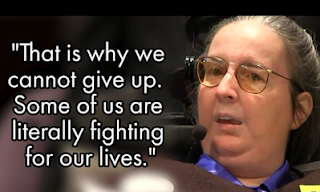Executive Director, Euthanasia Prevention Coalition
 |
| Cathy Ludlum, Second Thoughts Connecticut |
Connecticut assisted suicide bill SB 88 was defeated again. This represents the 10th assisted suicide bill to be defeated in Connecticut.
But the battle in Connecticut may return next year.
In March, SB 88 passed in the Connecticut Public Health Committee. The assisted suicide lobby tried to prevent the bill from going to the Judiciary Committee since this committee defeated previous assisted suicide bills.
The Judiciary Committee once again defeated the bill.
There are many groups and individuals who, year after year, have worked to defeat assisted suicide bills in Connecticut. Notably, disability rights group Second Thoughts Connecticut has maintained a focussed and consistent opposition to assisted suicide.
SB 88 was different than previous assisted suicide bills. It changed the language to hide the reality of the bill and to cover up that it still required falsification of the death certificate.
 |
| Stephen Mendolsohn |
No amount of change in bill language can change the fact that some people will suffer prolonged and agonizing deaths from the experimental lethal drug cocktails, with some even regaining consciousness only to die of their terminal illness. Nothing can change the fact that the currently most widely used lethal compound, DDMA / DDMA-Ph, contains amitriptyline, which burns the throat. Medical science cannot guarantee the peaceful death proponents claim. If lethal injections administered for capital punishment have resulted in inhumane deaths, oral ingestion of lethal drug compounds is far more likely to do so. We may put our pets down without their consent and for bad reasons—because they are unwanted or have behavior problems—but at least we do not make them ingest these experimental lethal compounds and make them suffer even more in the process.
No change in language can change the deadly mix between assisted suicide and a broken health care and home care system. As the cheapest “treatment,” assisted suicide diminishes choice, and especially so for people of color, disabled people, and others who have been historically marginalized in our health care system.
No change in language can change the problem of misdiagnosis or the unreliability of terminal prognosis. Jeanette Hall, John Norton, and Rahamim Melamed-Cohen have outlived ostensibly terminal prognoses by decades. All three became staunch opponents of assisted suicide.
No change in language alters the fact that offering suicide prevention to most people while offering suicide assistance (redefined as “aid in dying”) to an ever-widening subset of disabled people is lethal disability discrimination.
The changes that have been made in the bill from previous years are ineffective and do nothing to protect against mistakes, coercion, and abuse.
The EPC-USA testimony against SB 88 stated:
- The Bill allows Assisted Suicide with elastic and meaningless “safeguards.”
- Assisted Suicide is not about pain or receiving a peaceful death; both are myths.
- Assisted Suicide spawns more suicides and attempted suicides.
- Insurance companies use Assisted Suicide to deny coverage for curative life-saving treatments, offering to pay for Assisted Suicide instead. This raises equity concerns.
Thank you to everyone who helped to once again defeat assisted suicide in Connecticut.

No comments:
Post a Comment